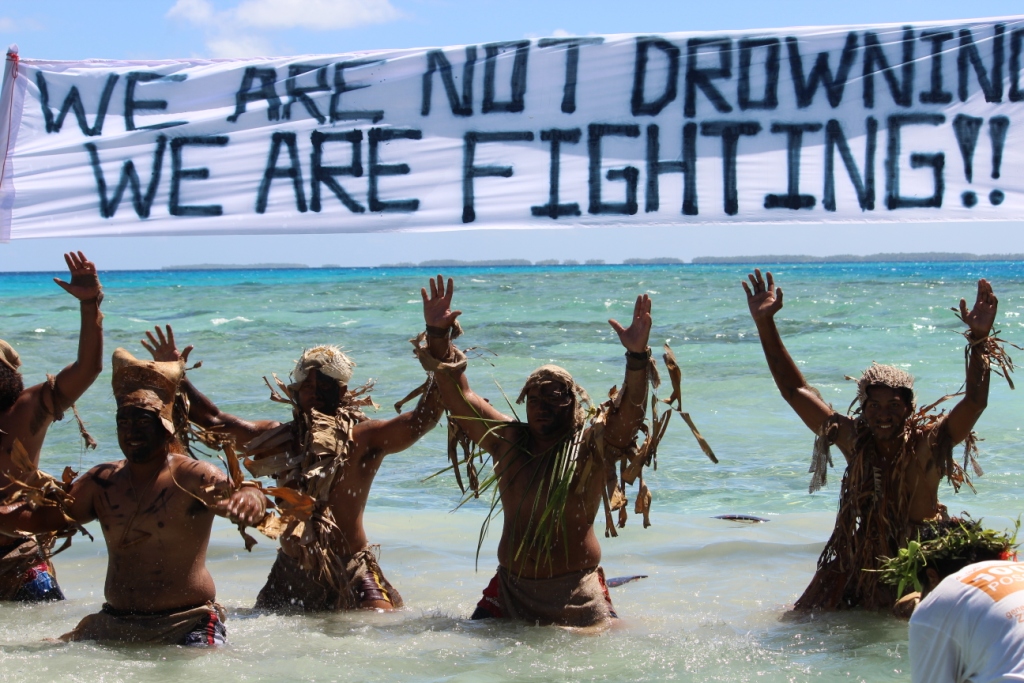In a further take-down of the claims of BHP Billiton and other coal companies that continued investment in coal is required to lift billions out of poverty, the Ulu (leader) of the Pacific Island nation of Tokelau, Aliki Faipule Kuresa Nasau, has written to the worlds biggest miner to challenge their claims. In the letter, the Ulu invited BHP Billiton’s President of Coal, Dean Dalla Valle to come to Tokelau to see the effects of climate change first hand.
The Ulu challenged Mr Dalla Valle’s claims that coal is needed to lift 1.7 billion out of poverty saying “I must disagree with you on the role which coal plays in achieving this vision as from my country’s perspective, continued extraction of coal will make poverty much worse.”
Mr Dalla Valle declined the invitation to visit Tokelau.You can read how the Ulu responded to BHP Billiton’s response, below. While Tokelau is on the frontline of climate change, being a collection of atoll islands incredibly sensitive to sea level rise, the island nation already leads the world in being the first 100 percent solar powered nation.

In recent months, the coal industry – from Peabody, the Australian Minerals Council, to BHP Billiton – have been waging a desperate PR war in an attempt to win back public and governmental support for coal, by framing it as the only viable solution to world poverty. They’ve met fierce criticism around the world, including from India, with this article: “Coal is no cure for energy poverty”.
Meanwhile, Pacific Island organisers across 15 Islands are preparing to send an even clearer message to Australian coal companies. On May 1st, 350 Pacific announced it has plans for a team of ‘Pacific Climate Warriors’ to voyage to Australia with traditional canoes, to carry a peaceful message that it is either the fossil fuel industry that has to back down, or the Pacific Islands. We are calling up the warriors of the Pacific to show that the Pacific Islands will not back down. You can read more about the Pacific Climate Warrior’s voyage and how you can support it, by clicking here.
___
Here is the response to BHP Billiton’s reply to the initial invitation from the Ulu o Tokelau (also viewable on ABC here, and an interview on Radio Australia with the Ulu about the letter here):
Dear Mr Dalla Valle,
Tokelau Greetings!
I thank you for your response to my letter sent on 10th April inviting you to visit Tokelau to witness first-hand the impacts of climate change on our nation, in light of your comments that coal is needed to lift 1.7 billion people out of poverty.
Whilst I appreciate your statement that the world must “pursue the twin objectives of providing access to energy to maintain and improve living standards and to alleviate poverty while addressing climate change”, I must disagree with you on the role which coal plays in achieving this vision as from my country’s perspective, continued extraction of coal will make poverty much worse.
As a nation of atoll islands, if the world lets global warming go beyond two degrees Celsius (which is the limit to warming that the world’s nations have agreed to through the United Nations process), then the sea and oceans will inundate our lands and seriously impact on the livelihood of our people. Here in Tokelau, our land is our existence, it is our ancestors, and it is our future. Without our land our heritage is threatened. So we hope you understand that for us, when it comes to climate change, everything is at stake.
From the information provided, your vision to grow the world’s coal sector by 17 per cent will be the cause for releasing a volume of carbon that will take the world well beyond the two degrees of warming. This plan puts the world on course to large-scale climate disruption.
Due to my country’s commitment towards mitigating and adapting the impact of climate change, Tokelau has made a conscious decision about how it develops its resources without compromise to its culture and the environment hence my hope that you will consider what is at stake for all small island states, like ours.
Tokelau has invested significant time, physical effort, and financial resources to addressing the detrimental impacts of climate change. We have done this by implementing mitigation projects toward the reduction of carbon emissions and becoming the first nation in the world to be fully (100 per cent) solar in its electricity requirements. This reduces our carbon emissions by approximately 1.4 million tonnes.
For this reason I am disappointed you have not taken up the offer to host you in Tokelau, and so that you can experience first-hand how the impacts of climate change are already causing this small nation challenges in meeting our vision for the future.
Yours sincerely,
Aliki Faipule Kuresa Nasau
Ulu o Tokelau